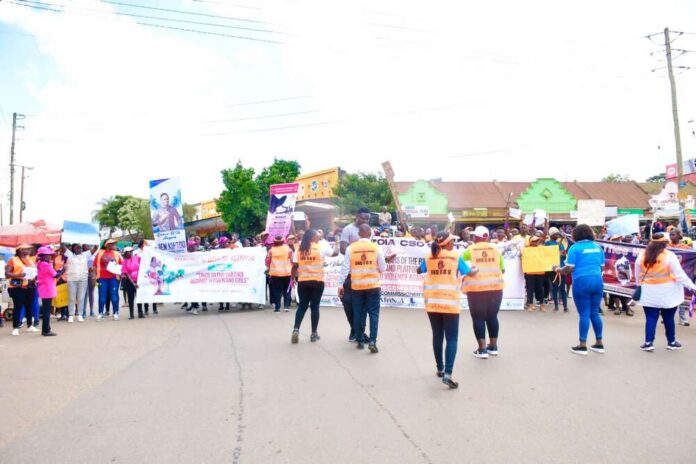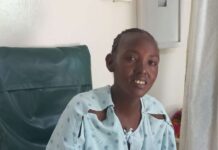By Sefu Sabila, DevReporter, Trans Nzoia County
- In 2024, cases of femicide in Kenya saw a dramatic increase, with nearly 150 women killed between August and November.
- Action groups and the Law Society of Kenya (LSK) are urging President William Ruto to declare femicide a national disaster.
- In addition to economic challenges contributing to the rise in cases of gender-based violence (GBV) in rural counties, cultural factors also hinder victims in their pursuit of justice.
GBV is currently a national threat, with the increasing number of women experiencing violence raising concerns and alarm across the country.
The surge in brutal murders and lifelong injuries inflicted on women has ignited a national debate.
Religious leaders, artists, and human rights groups are applying pressure on President William Ruto to declare killings among women a national disaster.
Undermined by Local Cultural Practices
In the rural county of Trans Nzoia, the quest for justice for victims of GBV is undermined by local cultural practices.
Anne Mutungi, founder of the Community African Network Action (CANA), the only rescue centre in Kitale currently sheltering women victims of GBV, highlights that victims often fail to attain justice due to outdated cultural norms.
She explains how male chauvinism among the Bukusu community obstructs the fight against GBV and contributes to its prevalence, alongside a lack of skills among women to earn an income.
“It is disheartening how men bully women and suppress their voices, as a woman’s voice is not considered valuable. Many men are unemployed and expect their wives, who have no skills, to provide for them. When this does not happen, they resort to violence,” she stated.
Mutungi also points to the role of local alcohol and unemployment, which lead to high poverty rates—another significant contributor to GBV.
“In our centre’s area, for example, by 7:00 pm, the entire village is intoxicated. The high levels of poverty exacerbate this situation, as unemployment drives many to drink,” she added.
Mama Purity, not her real name, shares her experience of enduring a violent marriage against her will, fearing the stigma of being part of a generation of divorcees.
Her only perceived failing is her inability to bear a male child, which is highly valued in the Bukusu community.
“I was cautioned against leaving my marriage, as the eldest daughter. My parents vehemently opposed my decision to leave, fearing it would lead to a generation of unmarried girls,” she recounted with pain.
With no stable income, her fears of being unable to provide her daughters with an education and a decent life are additional reasons she endures violence.
“I cannot offer my daughters what their father provides. Leaving my marriage would mean denying them their right to education,” she stated.
Challenges That Delay Justice
During the launch of the 16 Days of Activism against GBV, Trans Nzoia County Commissioner Mr. Gideon Oyagi stated that the county aims to eliminate Kangaroo courts. These informal courts are established in villages to address crimes against children, but they hinder the process of delivering justice.
“I want to assure you that the government is committed to eradicating Kangaroo courts. This will ultimately reduce the cases of GBV in the county,” Mr. Oyagi stated.
Mutungi highlighted several challenges that delay justice for GBV victims, including a lack of funds for rescue centres, the suppression of cases by local village elders, and a lengthy prosecution process.
Empowering Women
Mutungi is currently empowering women through mushroom production and socio-economic initiatives, which she believes are part of the solution to combating GBV.
“I am teaching them mushroom production and bamboo value addition so they can generate income. Economic empowerment is vital to ending GBV. We are also calling for support from leaders in Trans Nzoia,” she stated.
Additionally, Mr. Oyagi mentioned that the government is working to strengthen the gender-based desk within the police service, to enable to respond swiftly to victims seeking justice.
United Nations Women Deputy Country Representative in Kenya, Dan Bazira, proposes involving women in governance and developing a national action plan for combating GBV.
Furthermore, implementing legal frameworks such as the Convention on the Elimination of All Forms of Discrimination Against Women (CEDAW) will contribute to ending GBV. This treaty requires states to address all forms of discrimination and GBV.
The Beijing Platform for Action also calls for identifying actions that governments can take to prevent and respond to GBV.
Trans Nzoia County Gender Executive Committee member Mr. Patrick Gacheru stated that the fight against GBV requires collaborative efforts among stakeholders.






